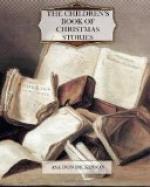But ere he could reach the arrased doorway, Prince Charles sprang to his side and cried, valiantly: “Nay then, if he goes so do I! ’Twas surely but a Christmas joke and of my own devising. Spoil not our revel, my gracious liege and father, on this of all the year’s red-letter days, by turning my thoughtless frolic into such bitter threatening. I did but seek to test the worth of Master Sandy’s lucky raisin by asking for as wildly great a boon as might be thought upon. Brother Hal too, did but give me his advising in joke even as I did seek it. None here, my royal father, would brave your sovereign displeasure by any unknightly or unloyal scheme.”
The gentle and dignified words of the young prince—for Charles Stuart, though despicable as a king, was ever loving and loyal as a friend—were as oil upon the troubled waters. The ruffled temper of the ambassador of Spain—who in after years really did work Raleigh’s downfall and death—gave place to courtly bows, and the King’s quick anger melted away before the dearly loved voice of his favourite son.
“Nay, resume your place, son Hal,” he said, “and you, gentlemen all, resume your seats, I pray. I too did but jest as did Baby Charles here—a sad young wag, I fear me, is this same young Prince.”
But as, after the wassail, came the Christmas mask, in which both Princes bore their parts, Prince Charles said to Archie Armstrong, the King’s jester:
“Faith, good Archie; now is Master Sandy’s snapdragon but a false beast withal, and his lucky raisin is but an evil fruit that pays not for the plucking.”
And wise old Archie only wagged his head and answered, “Odd zooks, Cousin Charlie, Christmas raisins are not the only fruit that burns the fingers in the plucking, and mayhap you too may live to know that a mettlesome horse never stumbleth but when he is reined.”
Poor “Cousin Charlie” did not then understand the full meaning of the wise old jester’s words, but he did live to learn their full intent. For when, in after years, his people sought to curb his tyrannies with a revolt that ended only with his death upon the scaffold, outside this very banqueting house at Whitehall, Charles Stuart learned all too late that a “mettlesome horse” needed sometimes to be “reined,” and heard, too late as well, the stern declaration of the Commons of England that “no chief officer might presume for the future to contrive the enslaving and destruction of the nation with impunity.”
But though many a merry and many a happy day had the young Prince Charles before the dark tragedy of his sad and sorry manhood, he lost all faith in lucky raisins. Not for three years did Sir Walter Raleigh—whom both the Princes secretly admired—obtain release from the Tower, and ere three more years were past his head fell as a forfeit to the stern demands of Spain. And Prince Charles often declared that naught indeed could come from meddling with luck saving burnt fingers, “even,” he said, “as came to me that profitless night when I sought a boon for snatching the lucky raisin from good Master Sandy’s Christmas snapdragon.”




